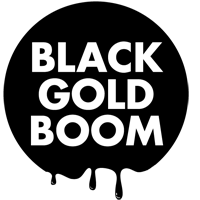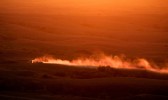(Editor’s note: This story includes updates.)
Drilling rigs are the most visible sign of the oil boom. The tall, thin structures stand out on the western prairie like birthday candles on a sheet cake. After about a month of noisy, dirty work drilling a hole, the oil starts flowing.
A grasshopper-shaped pumper replaces the drilling rig. This machine churns day and night, sucking oil out of the ground, quickly filling up nearby tanks.
Now, normally, from the tanks, the oil would be piped to refineries in Louisiana, Texas, Illinois and other places. But the pipelines aren’t finished yet. That causes oil companies to look for alternatives to pipelines.
“Once you’ve discovered the crude, royalty owners want to be paid,” says Jack Ekstrom of Whiting Petroleum. “You obviously want to sell the production so that you can take the cash that you receive for that and complete the development. So it is, by necessity, that you will find the means, whatever that means is, to get that crude to market.”
It may be years before enough new oil pipelines are built to serve the Bakken. So, in the meantime, a lot of crude oil from North Dakota is being shipped by train. Canadian Pacific and Burlington Northern Santa Fe — also known as BNSF — have beefed up operations in western North Dakota. In 2011 alone, BNSF added more than 460 people to its North Dakota payroll.
“On any given day you can ship just about anywhere in North America through the rail system,” says Tom Williams, top salesman for BNSF’s Industrial Products division.
To make that possible, BNSF and Canadian Pacific have built nine oil-loading terminals in western North Dakota. And that’s just in the past two years. In addition, BNSF is planning to open three more oil loading terminals by the end of 2013. BNSF’s Rangeland Terminal at Epping — located just east of Williston — has committed to carry 100,000 barrels of oil — daily. That’s about one-sixth of North Dakota’s current daily output.
Moving oil by rail is a lot more expensive than pipelines. Which is probably why all this talk of railroads seems to make Ekstrom rather grumpy. “You’d rather not have to do rail,” he says. “But if you have no alternatives and it becomes a matter of being able to transport the crude, obviously you’d build a rail facility.”
BNSF’s Williams believes that even after oil pipelines are built, his railroad will hang on to market share. “We really think there’s a long-term play for rail,” he says. “As pipeline expands, they’ll have a position and they’ll have their share. But we don’t see that completely pushing rail out of the equation. We are able to get crude directly to the refineries.”
In the meantime, North Dakota is poised to pump up its oil infrastructure. Governor Jack Dalrymple hosts a pipeline summit during this week in Bismarck.
— Todd Melby
UPDATE:
Black Gold Boom didn’t report on shipping costs in its story so we bring this information to your attention.
A July 19, 2012 story in the Washington Post asserts big costs for shipping oil by rail.
“Burlington Northern Santa Fe, owned by Warren Buffett’s Berkshire Hathaway, carries three-quarters of the oil transported by rail, often extracting steep fees. [Jack] Ekstrom of Whiting Petroleum estimates that transportation has been costing North Dakota petroleum producers $13 to $19 a barrel, much more than normal.”
The Post also used the worded “gouged” to describe these costs. Burlington Northern Sante Fe objected to that word, as the Washington Post ombudsman notes in this August 2, 2012 post.
ADDITIONAL UPDATE:
Since this story aired in 2012, train derailments in Quebec and Alabama have raised questions about the safety of transporting Bakken crude via rail.
Lac-Megantic disaster (Montreal Gazette)
U.S. oil worries predated Lac-Megantic disaster (CBC, Aug. 30, 2013)
Analysis: As Alabama flames fade, new oil-by-rail questions arise (Reuters, Nov. 11, 2013)
In Lac-Megantic’s wake, shippers test rules, not oil (Toronto Globe and Mail, Nov. 23, 2013)
Casselton, North Dakota explosion (Dec. 30, 2013, YouTube)
North Dakota Republican calls for oil boom slowdown after train crash (Jan. 3, 2014, Reuters)
North Dakota governor: Crude oil safety rules needed now (Jan.22, 2014, Reuters)
















